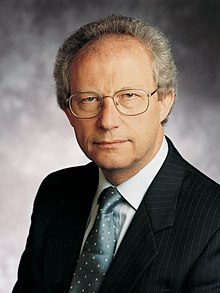
Back هنرى مكليش ARZ Henry McLeish German Henry McLeish Spanish Henry McLeish French Eanraig MacGillÌosa Scots/Gaelic Henry McLeish Hungarian Henry McLeish Italian Henry McLeish KW Henry McLeish Malagasy Henry McLeish Dutch
Henry McLeish | |||||||||||||||||||||||||||||||||
|---|---|---|---|---|---|---|---|---|---|---|---|---|---|---|---|---|---|---|---|---|---|---|---|---|---|---|---|---|---|---|---|---|---|
 Official portrait, 2000 | |||||||||||||||||||||||||||||||||
| First Minister of Scotland | |||||||||||||||||||||||||||||||||
| In office 27 October 2000 – 8 November 2001 | |||||||||||||||||||||||||||||||||
| Monarch | Elizabeth II | ||||||||||||||||||||||||||||||||
| Deputy | Jim Wallace | ||||||||||||||||||||||||||||||||
| Preceded by | Donald Dewar[a] | ||||||||||||||||||||||||||||||||
| Succeeded by | Jack McConnell[b] | ||||||||||||||||||||||||||||||||
| Leader of the Labour Party in Scotland[c] | |||||||||||||||||||||||||||||||||
| In office 27 October 2000 – 8 November 2001[d] | |||||||||||||||||||||||||||||||||
| Deputy | Cathy Jamieson | ||||||||||||||||||||||||||||||||
| UK party leader | Tony Blair | ||||||||||||||||||||||||||||||||
| Preceded by | Donald Dewar | ||||||||||||||||||||||||||||||||
| Succeeded by | Jack McConnell[e] | ||||||||||||||||||||||||||||||||
| |||||||||||||||||||||||||||||||||
| |||||||||||||||||||||||||||||||||
| Personal details | |||||||||||||||||||||||||||||||||
| Born | Henry Baird McLeish 15 June 1948 Methil, Fife, Scotland | ||||||||||||||||||||||||||||||||
| Political party | Scottish Labour | ||||||||||||||||||||||||||||||||
| Spouses | Margaret Drysdale
(m. 1968; div. 1995)Julie Fulton
(m. 1998; div. 2011)Caryn Nicolson (m. 2012) | ||||||||||||||||||||||||||||||||
| Children | 4 | ||||||||||||||||||||||||||||||||
| Parent(s) | Harry McLeish (father) Mary Slaven Baird (mother) | ||||||||||||||||||||||||||||||||
| Education | Buckhaven High School | ||||||||||||||||||||||||||||||||
| Alma mater | Heriot-Watt University | ||||||||||||||||||||||||||||||||
| Occupation | |||||||||||||||||||||||||||||||||
| Cabinet | McLeish government | ||||||||||||||||||||||||||||||||
| |||||||||||||||||||||||||||||||||
Henry Baird McLeish (born 15 June 1948) is a Scottish politician, author, academic and former professional footballer who served as First Minister of Scotland from 2000 to 2001. With a term of 1 year, 12 days, he is the shortest serving holder of that office. He served as the Leader of the Labour Party in Scotland from 2000 to 2001.
| ||
|---|---|---|
|
Minister of State for Scotland (1997–1999)
Minister for Enterprise and Lifelong Learning (1999–2000)
First Minister of Scotland (1999–2000)
|
||
Born and raised into a Labour supporting coal mining family in Fife, McLeish dropped out of Buckhaven High School at the age of fifteen to pursue a professional career in football. Playing wing half, he was first signed for Leeds United F.C., but after experiencing homesickness, McLeish returned to his native of Fife to play for East Fife F.C. Making more than 108 appearances, he was one of the youngest ever players to play in Scottish professional football. McLeish's career was cut short after an injury and he returned to education, studying at Heriot-Watt University.
McLeish joined the Labour Party in 1970 and was later elected to the Fife Regional Council, where he served as the council's leader from 1982 to 1987. After several unsuccessful attempts to be elected to the British House of Commons, McLeish was successful in the 1987 general election, when he was elected as member of parliament for Central Fife. He served successively in Labour's opposition benches for ten years, before being appointed minister of state for Scotland under Prime Minister Tony Blair following the party's landslide victory in the 1997 election. McLeish served as Donald Dewar's 'right-hand man' in the Scottish Office and was instrumental in assisting Dewar with the creation of the Scotland Act which established the Scottish Parliament. In the first election to the parliament in 1999, he was elected as a member of the Scottish Parliament for the Central Fife constituency. Following the appointment as Dewar as the inaugural first minister of Scotland, he served in the first Scottish Executive as the minister for enterprise and lifelong learning from 1999 to 2000.
Dewar died in office of a brain haemorrhage on 11 October 2000, which triggered a leadership contest within the Labour Party to find a successor, with McLeish declaring his candidacy. He led a successful and short campaign after defeating finance minister Jack McConnell. McLeish was sworn into office as first minister of Scotland on 26 October 2000. He oversaw the implementation of the McCrone Agreement for teachers in Scotland and strongly advocated free personal care for the elderly scheme. His tenure as first minister was short, as he resigned the following year following a financial scandal referred to as "Officegate"; the first major scandal the Scottish Parliament had faced since its reincarnation two years earlier. He was succeeded by McConnell, who he had beaten in the previous leadership election. McLeish sat as a backbencher, before stepping down as an MSP at the 2003 election.
Since leaving office, McLeish has remained politically active and has written several books. In 2007, he was appointed to the Scottish Broadcasting Commission and the following year he chaired the Scottish Prisons Commission.[2] In the 2014 Scottish independence referendum, he campaigned in favour of remaining in the UK. However, following the Brexit referendum, McLeish stated he would back another Scottish independence referendum if Scotland was taken out of the EU against its wishes.
Cite error: There are <ref group=lower-alpha> tags or {{efn}} templates on this page, but the references will not show without a {{reflist|group=lower-alpha}} template or {{notelist}} template (see the help page).
- ^ Henry McLeish at Post War English & Scottish Football League A–Z Player's Transfer Database
- ^ Cite error: The named reference
reportwas invoked but never defined (see the help page).

